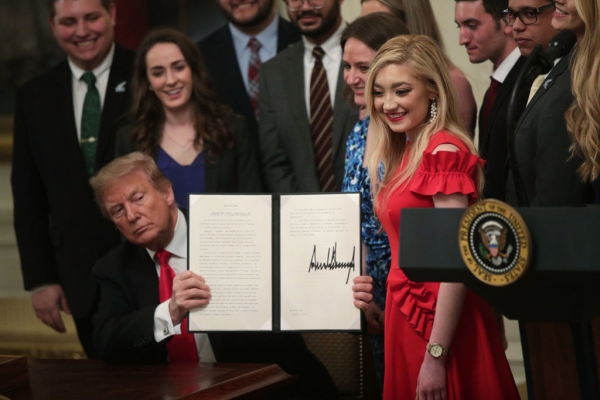You have /5 articles left.
Sign up for a free account or log in.

Former president Trump has pledged to make significant changes to higher education if he wins a second term.
Nic Antaya/Getty Images
For America’s colleges and universities and the students they serve, the four years of Donald Trump’s first term as president were fraught, defined by threats to international students, allegations of “radical left indoctrination,” free speech controversies and far-reaching attacks on fundamental institutional values such as diversity.
Since Trump left office in 2021, universities have continued to grapple with the legacy of his term and the movement it spawned. His four years in office helped to pave the way for the Supreme Court’s decision last summer banning race-conscious admissions. A controversial executive order spurred a cascade of state laws banning diversity, equity and inclusion programs and policies. Meanwhile, the rise of MAGA Republicanism spawned supercharged culture wars, entangling campuses and prompting some state officials to get increasingly involved in how public universities are run and what’s taught in classrooms.
Now, Trump is back and seeking another four years in the White House, and higher education could be in for greater scrutiny and heightened pressure if he wins. Higher education wasn’t high on Trump’s priority list the first time around, but an increasing anti–higher education sentiment among Republicans and sectors of the public has shifted the political winds. That could open the door to more radical policy options.
Trump has already vowed to “fire” accreditors and reclaim colleges from the “radical left,” called for the creation of a free national online university paid for by taxes on wealthy colleges, threatened to deport campus protesters and backed extending green cards to college graduates. The Republican Party’s 2024 platform, which Trump’s team helped to write, calls for closing the Education Department and creating more affordable higher education options, along with deporting “pro-Hamas radicals and [making] our college campuses safe and patriotic again.”
In a second term, Trump would also have a sharp critic of higher education as his No. 2. His pick for vice president, Ohio senator J.D. Vance, has been an unsparing critic of universities, which he’s characterized as being dedicated to “deceit and lies, not to the truth” and controlled by “left-wing foundations.”
Brendan Cantwell, a professor of education at Michigan State University, sees a systematic approach in Trump’s agenda and other conservative plans for higher education. They want to make “deep, structural changes,” he said, and “convert the rhetoric about higher education that we’ve seen on the political right into policy.”
“I see the possibility of one or more of these levers being used to fundamentally remake the higher education sector as we know it,” Cantwell said. “Federal policy is what facilitated the creation of the higher education sector that we know today, and it’s the federal government that can undo it.”
Trump’s potential return to the White House comes at a time when colleges and universities are grappling with numerous challenges, from declining enrollment and shrinking budgets to campus tensions and a drop in public confidence. A potential second Trump term would likely exacerbate those challenges, according to interviews with a dozen liberal and conservative policy experts as well as college professors and leaders.
Why? Because the decrease in public trust over the last decade has made institutions more vulnerable. On top of that, President Biden’s efforts to forgive billions in federal student loans have infuriated Republicans, spurring lawmakers in Congress and the states to get more involved in higher ed policy. The campus protests in the aftermath of Hamas’s Oct. 7 attack on Israel and the ensuing war in Gaza added fuel to the fire, triggering congressional investigations and combative hearings with college leaders.
“There’s a good chance that higher ed could be front and center because it has made itself a target of populist frustration,” said Frederick Hess, director of education policy studies for the American Enterprise Institute, a conservative think tank.
Experts generally expect that rolling back policies put in place by the Biden administration and overhauling accreditation to allow alternative providers of college credentials to access federal financial aid would be among the first priorities for the Trump administration.
On the chopping block would likely be new Title IX protections for LGBTQ+ students, along with Biden’s new income-driven repayment program that lowered monthly payments for millions of borrowers. A second Trump administration could also seek to scrutinize foreign funds that flow to colleges.
The agenda for a potential second term is in some ways similar to the first. The Betsy DeVos–led Education Department rolled back Obama-era policies that would have held for-profits accountable, stepped up enforcement of a federal law that requires colleges and universities to report foreign gifts and contracts, and rewrote the Title IX regulations, leaving a controversial legacy that hasn’t stood the test of time. Few of those changes have survived the Biden administration.
DeVos also criticized colleges and faculty members for telling students “what to think,” a claim higher education leaders have pushed back on. “They say that if you voted for Donald Trump, you’re a threat to the university community,” she said in a February 2017 speech. “But the real threat is silencing the First Amendment rights of people with whom you disagree."
Trump himself derided “radical left indoctrination” at elite institutions. He also threatened to review the tax-exempt status of nonprofit colleges and universities and to cut off federal funding to the University of California, Berkeley, for allegedly restricting the speech of conservative speakers. His Education Department discouraged the use of race in college admissions decisions and investigated Princeton University in fall 2020 after its president acknowledged that institutional racism exists on the campus.

Alex Wong/Getty Images
But the first Trump administration was considered disorganized and chaotic. The Education Department struggled to run loan forgiveness programs such as Public Service Loan Forgiveness. Under that program, created in 2007, borrowers who work in public service jobs such as teaching can get their loans discharged after making payments for 10 years. Borrowers first became eligible for relief in September 2017—nearly a year into Trump’s first term—but few individuals received forgiveness.
This time around, the Trump team will be more prepared to govern. To assist in that effort, the conservative Heritage Foundation has spearheaded an effort known as Project 2025 to recruit and train employees to serve in the administration and provide a blueprint to radically reshape the federal government, higher education policy included. Trump has recently tried to distance himself from Project 2025, although several of its proposals—abolishing the Education Department, for one, and rescinding Biden’s Title IX rule—overlap with his own agenda and the party’s platform. Further, several former officials who worked in the DeVos-led department helped write the Education Department section of Project 2025.
“The incoming Trump administration will be more radical in what they want to do and hit the ground more quickly in what levers they want to pull,” said Amy Laitinen, senior director for higher education at New America, a left-leaning think tank. “That’s a bad combination.”
Shifting Political Winds
Before Trump took office, 57 percent of Americans had either a great deal or quite a lot of confidence in higher education, according to Gallup. Now, only about 36 percent of Americans express confidence, and the drop is starker among Republicans. A June Gallup survey found that 20 percent of Republicans are confident in higher education—a 36-point drop since 2015.
“I haven’t seen the public view higher education this negatively in my lifetime,” said Andrew Gillen, a research fellow at the conservative Cato Institute’s Center for Educational Freedom. “I think you could get a lot more support for something that the universities would have been able to brush off in the past. I think they are going to have a much harder time now.”
Policy ideas on the table range from the likely—rewriting or reversing the Biden administration’s regulations—to the more radical and far-fetched, like getting rid of the Education Department. More threats to tax institutions and strip their federal funding are expected.
“What should worry the higher ed community and the progressives is that the extent that Biden gets away with rewriting so many of the rules and laws around federal student aid is that you have created a landscape where I think it’s possible that a Trump administration would no longer feel particularly constrained by the letter of the law,” Hess said.
Republicans have already proposed bills to charge wealthy colleges for unpaid student loans and use that money for students in short-term workforce training programs. Lawmakers will likely redouble their efforts to restrict institutions’ diversity, equity and inclusion policies and penalize those that they find to be insufficiently protecting Jewish students.
Jason Delisle, a nonresident senior policy fellow at the Urban Institute’s Center on Education Data and Policy, said it all represents a sea change for Republicans. They used to take a hands-off approach to higher education and view a college degree as a pathway to good jobs and a way to grow the economy, he said, which justified the necessary federal investment. Now, “that calculus is gone from the thinking of most Republicans.”
The new thinking is reflected in a sweeping plan to overhaul higher education introduced earlier this year that would put colleges on the hook for unpaid student loans, use graduates’ earnings to evaluate programs and link some funding for institutions to their student outcomes, among other proposals aimed at lowering the cost of college and holding institutions accountable. The legislation, known as the College Cost Reduction Act, has 145 co-sponsors.
“The most interesting thing is the change among folks on the right, and I think I count the Trump people in this, for their skepticism of higher education—the skepticism of the value of it, their skepticism of culture war—in a way that did not exist in 2016,” said Delisle.
If Republicans control the House or Senate—or both—will likely continue to investigate campus antisemitism and hold hearings to question college presidents while branching out to other hot-button issues as well. Some higher education groups and advocacy organizations have argued that the hearings and investigations, which have included requests for troves of internal documents and communications from the targeted universities, have echoes of the McCarthy era and threaten academic freedom and institutional autonomy.
“If they were smart, they would double down on the culture war stuff. It works for them,” said Laitinen. “But they don’t need to do the policy. They can get the same wind [in their sails] from press conferences and hearings … The bully pulpit is enough for what they want to do.”
What Trump can accomplish on policy will depend in part, of course, on whom he picks to run the Education Department, if it survives. If the agency is staffed with populists and Trump loyalists, some observers predict a greater focus on culture war issues designed to rile up voters rather than substantive policy.
That group, Hess at AEI said, would be “more hard-charging and much less concerned about ruffling feathers.”
“These are people who thrive on the attack, but … the populist wing is not people who spent a lot of time worrying about the particulars of 400 Maryland Avenue,” Hess said, referring to the address of the Education Department. “They aren’t policy wonks. So part of the challenge is can they find policy wonks to help them figure out how to translate what they want to do into change.”
The scrutiny on higher education and culture wars could elevate the profile of the education secretary. The gig has not typically gone to ambitious politicians. But it could now be more attractive for someone interested in launching a bid for Senate or the White House in 2028, or at least to someone with a background in—and an agenda for—higher education policy.
“Certainly, education looms large enough, given the degree to which our ideological clashes are cultural. It could be a real opportunity for somebody who wants to set themselves up,” Hess said.
Can Institutions Fight Back?
The potential second Trump administration comes as university leaders, who pushed back on Trump’s policies and rhetoric in the first term, are bruised and battered. Already, some have signaled that they’re less willing to engage in political fights going forward. Harvard University, for example, said in May that it will no longer make statements on political issues. But the stakes for colleges and universities couldn’t be higher, and some leaders are already calling for stiffened spines in anticipation of what may be coming.
Underpinning the potentially sweeping policy changes is an anti-intellectual agenda that’s an “assault on the mission of higher education” and promises to usher in “a much more dangerous period” than the first term, said Patricia McGuire, president of Trinity Washington University and an outspoken critic of the Trump administration.
“Everything else is details that we will learn to live with,” she said. “I hope that my colleagues as presidents don’t get distracted by the bureaucratic agenda, because bureaucracies are all always with us. It doesn’t matter what the name of the bureaucracy is.”
While “higher education is the counterweight to government,” McGuire said, the academy can’t serve in that role without academic and intellectual freedom, which some officials are aiming to restrict. “If we don’t preserve academic freedom, that’s the ball game,” she said.
McGuire and others say that at a time when traditional higher education is threatened, they are worried that university leaders will stand on the sidelines rather than fighting back. They point out that when Florida governor Ron DeSantis, a Republican who briefly ran for president, made a number of reforms to the state’s colleges and universities and orchestrated a conservative takeover of the New College of Florida, no presidents in Florida spoke out.
“We’re caving in on our values without any fight,” McGuire said. “This is what bothers me more than anything else, and it tells me that we’re not ready for a second Trump term. Because it’s going to come fast and furious, and most of higher ed is going to lay down and hope it goes away. And it’s not going to go away.”
Keith Curry, president of Compton College, a community college, said he learned from the first term the importance of staying focused on his college’s mission to support students while standing up for them. No matter what happens in November, he said he’ll keep doing just that. “We have to be unapologetic, regardless of who is the president of the United States,” he said.
Curry acknowledged that not all college leaders are in a position to speak out, and that doing so is more difficult after Trump’s first term and the intensifying criticisms from state and federal lawmakers in the years since. Curry said some leaders are nervous and concerned, but “we gotta be thinking about what’s best for our students and how we stand up for our students. For some leaders, standing up for them and being unapologetic, some of us could actually lose our jobs.”
Trump’s first term amped up the age-old criticisms of “liberal” universities, putting them in the middle of contentious debates over what students are taught. The prime example was an executive order banning the promotion of so-called divisive concepts in federally funded programs, which disrupted campus diversity programs. State leaders responded with bans on what they called critical race theory and diversity, equity and inclusion programs. So far, 14 states have passed laws restricting DEI policies and offices on college campuses—legislation based on that 2020 executive order.
“It was a big signal that this was potentially fruitful ground for Republicans, and of course, it rippled out in a pretty significant way,” said Steven Brint, a professor of sociology and public policy at the University of California, Riverside.
Kaleb Briscoe, an assistant professor of adult and higher education at the University of Oklahoma who studies campuses’ racial climates and hate crimes, and other experts say the attacks on DEI and Trump’s time in office inflamed tensions on some campuses and spurred an increase in bias-related incidents, such as students leaving nooses around campuses or wearing blackface.
“We have not recovered within higher education,” she said, “and it would be catastrophic if he had another term.”








